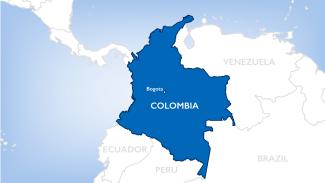
Demonstrating the transformative power of the peace accord.
WHY USAID/OTI IS IN COLOMBIA
Colombia has experienced armed conflict with insurgency groups for over 50 years. Among the root causes are lack of state presence and structural inequities that have created a divided nation, i.e., a modern, urban Colombia versus an impoverished, neglected, rural Colombia, where most of the conflict takes place.
The 2016 Peace Accord signed between Colombia’s largest guerrilla insurgency group, the Revolutionary Armed Forces of Colombia (FARC) and the Government of Colombia (GOC) is one of the world’s most comprehensive, requiring wide-ranging reforms related to rural development, inclusive political participation, transitional justice, and the reduction of illicit economies such as coca cultivation. Despite significant progress, Colombia continues to face many challenges implementing this complex plan. The security context has deteriorated as new armed groups and drug trafficking organizations emerge to fill the vacuum left by the FARC. OTI strives to help Colombia—one of the United States’ most important allies in the region—fulfill its obligations in accordance with local priorities while adapting to emerging security challenges.
USAID/OTI’S ROLE IN COLOMBIA
OTI’s program, Colombia Transforma, is part of the U.S. government’s efforts to support a sustainable and inclusive peace in Colombia. The program seeks to demonstrate the transformative power of the peace accord by:
Strengthening sustained engagement of local government and strategic regional actors in peace accord implementation; and
Piloting approaches to challenge social norms that perpetuate the conflict, and affect local security.
PROGRAM HIGHLIGHTS
USAID/OTI uses a collaborative model to implement activities, where local governments, grantees, and beneficiaries each contribute a share of resources (such as labor, materials, and funding) to the process. This is particularly effective for small, community infrastructure projects like schools, tertiary roads, and community centers. Two external evaluations found clear evidence that this optimizes limited resources, builds trust, increases transparency, and strengthens the skills and relationships of stakeholders—all essential factors to achieving the Peace Accord’s vision to transform Colombia’s conflict-affected regions.
- USAID/OTI prioritizes engagement and capacity building in veredas—the smallest territorial unit in Colombia—which usually have between 50 and 1,200 inhabitants, and often lack officially-defined boundaries. In veredas, Community Action Boards (JACs) serve as the primary form of social organization and community governance, positioning them as key actors for peace agreement implementation in rural, conflict-affected areas. Under Colombia Transforma, JACs receive financial and legal training to file tax information and obtain formal registration, endowing them with the legal certification to administer funding and access government resources. By securing the credentials to implement government-funded projects, JACs can ensure more funding reaches their communities, and citizens’ needs are reflected in community development plans.
